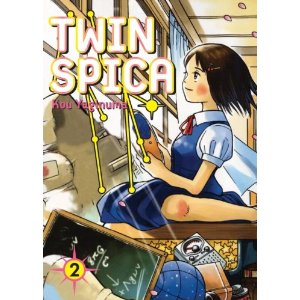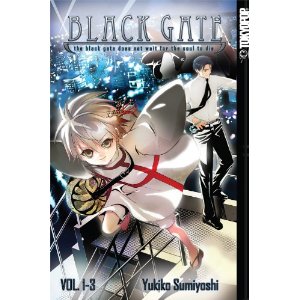Silver Diamond is one of those series I think of as being a bit under the radar. I don’t see many posts about it on manga blogs, and this shonen ai manga itself is a bit odd, since it focuses on the adventures of a boy who can magically grow plants as he journeys to another world and all the cute men who enjoy hugging him. Sometimes I’m not sure if I can hang on for another 13+ volumes, but then I pick up a volume of this manga and I’m reminded again how much I like Sugiura’s creative world building and cozy atmosphere.
Silver Diamond Volume 6 by Shiho Sugiura
The sixth volume of this manga shows the demonic ayame prince (who looks suspiciously like green-thumbed hero Rakan) issuing a new prophecy: a god of death will bring new calamities on the desert world, but the people will persevere as long as they continue supporting him. The prophecy is issued as a response to the presence of Rakan, whose sanome powers to make plants grow have the potential to make the world green again. Rakan and his companions are journeying with a group of lost boys who were cast off from their families. Rakan is furious at the implied threat from the prince, and his anger manifests itself as a field of glowing flowers. Cut off from their new followers, Rakan, Senroh, Narushige, and Tohno continue to march towards the capital.
Silver Diamond Volume 7 by Shiho Sugiura
I liked the seventh volume a little more just because there was more wacky plant action and hugging, which are the main features I have come to expect from Silver Diamond. Rakan wakes up to find Narushige holding his hand, telling him to “get out of there.” The “there” in question is Senroh’s arms, who calmly announces that he decided to be Rakan’s pillow. The group is taking shelter in a storehouse with some unique seeds. Rakan is able to create plant-fences and plant-spiral-staircases with some of the preserved seeds. The domestic idyll ends quickly when an assassin from the prince sends in lizard-dogs made of stone and controlled by mystical garnets to kill Rakan.
Senroh takes care of things, aided by a plant rifle that Rakan grows quickly. One of the nice things about Silver Diamond is the cool action scenes. It was fun to see Senroh spring into action as a sniper with his dark glasses and vine entwined rifle. The stone lizard-dogs look appropriately mindless and creepy. The assassin confronts the group, and we see that there is at least one person Rakan can fail to charm. Finally, we get a female to join Rakan’s revolution as a giant stone-eating wolf decides to take up with the group after she dines on the assassin’s lizard dogs. Rakan welcomes her with the same openness that has won over his other companions in the past. Cute animal sidekicks is a plot element that Sugiura seems to specialize with. I wonder how the cynical snake Koh will get along with Kuro, who just seems to have a crush on every human boy she meets.
Even though Rakan and his companions are launching a rebellion against a prince and his cronies who have mystical powers of their own, Silver Diamond has a certain lack of urgency that I find relaxing as opposed to boring. The constant affirmation of friendship and the unique details of Sugiura’s fantasy world remain interesting, even if the general plot might be a little less drawn-out if this manga was being produced by a different author.



